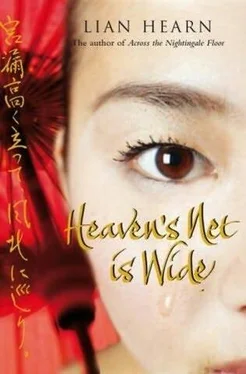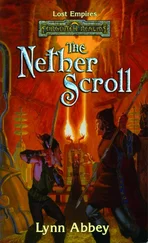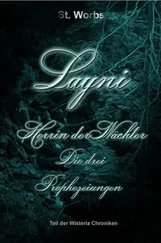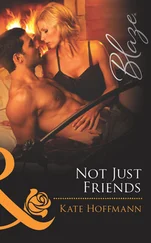“Take my sword, and I will fight with Inaba’s; that will make us equal.” Miura unsheathed the sword and took a step forward. “Either we fight or I cut you down now, you and your pupil. Fight me and whatever the outcome, I will spare him.”
It was clear the warrior was not going to be dissuaded. Shigeru felt his heartbeat pick up. He tightened his grip on the pole and moved his feet slightly so the setting sun fell over his shoulder.
Matsuda said, “Since you show such consideration for my pupil, you may fight him.”
Miura sneered. “I don’t challenge boys or novices.”
Matsuda addressed Shigeru formally. “Lord Otori, take Lord Miura’s sword.”
Shigeru bowed equally formally, handed the pole to his teacher and stepped forward. There was a moment when he felt his own complete vulnerability, unarmed before Miura’s sword. He masked it by gazing calmly at the warrior, assessing him.
Miura was a little shorter than he was, ten or fifteen years older, and much broader in the shoulders. His arms and legs were solid with muscle. Shigeru guessed his technique would be grounded in power rather than speed. His reach would be limited. His strength would be greater, but he had not been taught by Matsuda Shingen.
“Lord Otori?” Miura said, taken aback. “The oldest son? Shigeru?”
“Lord Otori is the only man who has ever bested me,” Matsuda said calmly.
And there was another advantage. Miura was disconcerted by the situation that now presented itself, into which his own blustering had led him. To challenge Matsuda and kill him was one thing; to kill the heir to the Otori clan was quite another. It might be Sadayoshi and Sadamu’s secret desire, but it could never be condoned by them publicly or forgiven by the Otori. It would plunge the Three Countries into immediate war. Miura’s life and the lives of his family would be forfeit.
Good, Shigeru thought. The sooner we fight the Tohan, the more likely we are to defeat them. My father has another son. It seemed suddenly, in that moment, a good death, and he chose it steadfastly, neither looking at the future nor dwelling on the past.
“Give me your sword,” he said.
“You will let a boy fight in your place?” Miura attempted to browbeat Matsuda.
“As I said, Lord Otori is my better. Defeat him and you defeat me. You may then take my life, worthless as it is. All the insults you imagine will be wiped out. And I certainly will not have to go to Inuyama. Give your sword to Lord Otori as you suggest. It seems quite fair to me, unless you often practice with your companion’s sword.”
“I have never held it in my hands till now,” Miura replied.
The exchange of swords was made. Shigeru took Miura’s in both hands and, stepping to one side, looked at it carefully. The cutting edge was unblemished, the curved steel perfectly honed. It was a little heavier than his own, suiting Miura’s greater bulk, but its balance was good and it responded to his grip. He made a couple of swift passes through the air and heard the steel sing as the sword came to life. He deliberately chose simple, basic exercises, knowing Miura would be watching him, hoping to maintain the disconcertion, hoping to lull him into overconfidence.
He felt his teacher’s trust and had the same confidence in him, knowing Matsuda would never put his life at risk, would have fought Miura himself rather than do that.
They faced each other on the sandy ground. Inaba took the horses a little distance away and stood between them. Matsuda was on the opposite side of the clearing. He said nothing but gazed steadily at Shigeru.
It was over quickly. Miura made a conventional attack, not unlike the sort of thing Shigeru had learned from his sword teacher in Hagi, Irie Masahide. He was strong but slow and less than wholehearted, as Shigeru had suspected. Shigeru’s upbringing and training had prepared him for this moment; he had known it would come and he was ready for it. He had not longed for it, but neither did he flinch from it. He feinted against the attack, making it look as if he would repeat the elementary exercise he had just practiced, and as Miura’s sword responded, he moved the other way and found the unprotected area between chest and groin.
He was amazed at how easily the blade slid through clothing and flesh, how swiftly it whipped back and cut again, this time into the top of the neck as Miura fell forward. Shigeru was filled with a terrible sense of anguish as the blood spurted from the neck and foamed from the belly, anguish and sorrow at the fragility of flesh and bone, and of the life they held together. It seemed an appalling thing that a man should travel so swiftly from life to death, the abrupt journey from which there was no return. He wished he could turn time back to a world in which Miura and Inaba never came at sunset to the lonely shrine, yet he knew he had to accept that Miura had come there to meet the death decreed for him at Shigeru’s hands.
“Lord Miura!” Inaba cried, dropping the horses’ reins and running forward. The horses reared at the smell of blood and trotted off across the clearing, one of them whinnying loudly, eyes rolling.
Miura died without speaking.
I have killed, Shigeru thought with neither pleasure nor elation but rather with a sense of dread and heaviness, as though he had lost the lightness of boyhood and taken on adulthood with all its burdens.
Matsuda picked up Inaba’s sword from where it had fallen. “Lord Shigeru, catch the horses before they wander off. Inaba, take your master’s head and carry it back to Inuyama. I expect you to give an accurate account of his death, which was not without honor.”
Shigeru, persuading the horses to allow themselves to be captured, heard the blow that separated the head from the body. Matsuda brought water from the spring and washed the blood from the face, wrapping it in a cloth from the hut, apologizing for the poor quality of the fabric.
Inaba’s eyes were bright with emotion, but he said nothing. He took a container from the saddle bow of his horse and placed the head reverently inside. Then he undid the scabbard from Miura’s belt, wiped the sword, checked the blade, then returned it to the scabbard.
“Lord Otori.” He bowed to Shigeru and laid the sword on the ground before him.
“You may take the body to Terayama,” Matsuda said. “They will arrange for burial there.”
“No!” Inaba said. “Lord Miura must not lie among the Otori. I will take him back to the East. When I have performed this last service for him, I will join him in death.”
“As you wish,” Matsuda said, and helped the other man strap the body onto the horse while Shigeru held the animal steady, soothing it as it trembled.
Inaba mounted and rode slowly down the slope. After a few minutes the sound of the hoofbeats died away. The sun had set completely, but it was not yet dark.
“Go and cleanse yourself,” Matsuda told Shigeru. “We will pray for the dead.”
As the light faded and the stars began to gleam, the old man chanted the sutra for the dead, the ancient words acting as a ligament between Earth and Heaven, this world and the next.
Later, Matsuda said, “I knew you were in no danger.”
“You would never allow me to be,” Shigeru replied. “It gave me confidence.”
“You did well. Miura has been an excellent fighter and a good teacher. Sadayoshi should not have slighted him.”
“It seemed almost as though you might have contrived it,” Shigeru ventured.
Matsuda replied, “I would not contrive in anyone’s death-I don’t need to, for fate brings all of us to that final encounter. But if I had wanted to, I could not have set up anything better.”
THE NEXT DAY was even hotter; the sunlight had the same bronzed tinge and the air was oppressively heavy and still, as though Heaven held its breath. The cicadas’ drone continued mercilessly, but all birds seemed silenced by the heat.
Читать дальше












